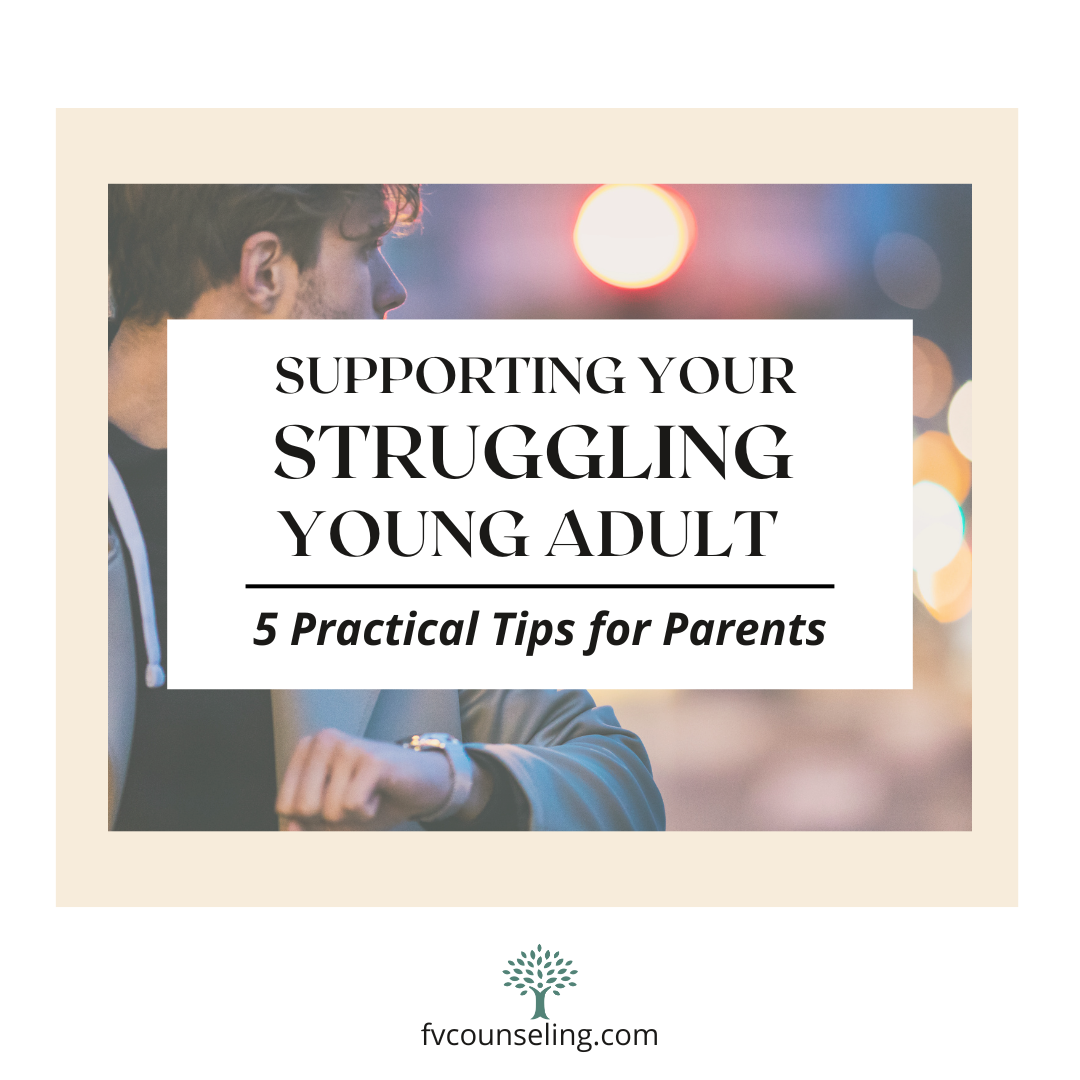SUPPORTING YOUR STRUGGLING YOUNG ADULT: 5 Practical Tips for Parents
/Thinking back to high school graduation, you likely felt relieved that you and your child had made it through a pretty challenging four years. You imagined life after high school would offer a fresh start with exciting opportunities. Unfortunately things have not turned out exactly as planned. In fact, the post-high school years have turned out to be incredibly stressful for your young adult and YOU!
Whether your young adult is struggling with college, finding work, managing finances, or navigating relationships, it can be difficult to know how to best support them. You want to encourage independence and autonomy, but you are likely also providing lots of financial and emotional support and sometimes you wonder if your being helpful or if you’re actually enabling a level of unhealthy dependence.
If you’re wondering what to do to manage the complex dynamics of this difficult time, here are 5 practical tips for parents to encourage successful “adulting” in the post-high school years.
COMMUNICATE OPENLY
It’s essential that you create a safe space to talk openly about the challenges your young adult is facing. You want to encourage them to share about their difficulties without fear of criticism or feeling ashamed. It’s important to validate their feelings (it’s really hard for them to be going through this tough time!) and let them know that you are there to provide unconditional support. When your young adult knows that you are there to help figure out next steps, you will build a stronger relationship, one of the keys to guiding them to the next stage of life.
OFFER SUPPORT
You’ve got a lifetime of experience. Share your helpful tips and strategies around job searching, budgeting, finding housing, and/or finding mental health support, if needed. You likely have some connections in your social or vocational circle who can provide opportunities for your young adult. Think about your resources and how they may be able to help. It’s often helpful to tell them about your own struggles around adulting (chances are things did not go smoothly for you all the time either). Share your wisdom, support around concrete resources, and show your adult how to think critically and to problem solve to overcome adversity.
ENCOURAGE INDEPENDENCE
Young adulthood is a time when your child is learning to be autonomous and to make decisions on their own. It’s important that you support their independence, which includes allowing them the opportunity to make mistakes, learn from their failures, and experience natural consequences of their actions. Your job is NOT to jump in there and fix things, but to be supportive and encouraging while your young adult is learning important skills required to successfully navigate in the world.
SET REALISTIC EXPECTATIONS
Clearly your young adult is struggling and they are not where they had hoped to be at this point in their life. (This is NOT what you had envisioned for them either.) It’s important to step back, help them reflect on their goals, and to strategize around small, incremental steps to get there. Perhaps this means taking a leave from college to prioritize mental health or working a part-time job rather than staying in a demanding, high stress, full-time job. Maybe the decision is to move back home for a while. Whatever you decide together, be sure that you’re setting reasonable goals that are attainable under the circumstances.
ENCOURAGE SELF-CARE, INCLUDING MENTAL HEALTH CARE
One of the most important things you can do as a parent is to support your young adult in making healthy choices that promote self-care. As you know, one of the most important things we can all do is to learn how to prioritize and care for ourselves throughout our lifetime. When it comes to your young adult, you can offer support in grocery shopping and learning how to both select healthy food options on a budget. You can also encourage daily exercise and good sleep hygiene, something a lot of young adults (and people of all ages) struggle doing. In addition, it may be especially helpful for your young adult to connect with a skilled therapist who can provide professional support during this tough time and offer strategies that will lay the groundwork for successful adulting. Many times it’s easier for a young adult to explore these issues with someone other than you… and that is a very healthy, good thing. It can be challenging to navigate mental health system and to find the right therapist, so it is incredibly helpful for parents to help with the process and to cover the cost of treatment.
It is definitely not easy to watch your young adult struggle with figuring out this challenging time in their life. Know that the way you show up for them and the support you offer makes all the difference. The path may be windy (and bumpy), but trust that your young adult will one day successfully transition into the adult world, especially if you are there guiding and supporting them along the way.
At Farmington Valley Counseling Center we work with many young adults who are struggling with the post-high school years. In addition to providing individual therapy focused on skill building, goal setting, navigating relationships, and building autonomy, we also offer YOUNG ADULT SUPPORT GROUPS. These groups provide a safe, supportive and confidential place for young adults to talk about their post-high school challenges and to connect with peers who are in similar situations and truly understand the struggle.
TO LEARN MORE ABOUT OUR YOUNG ADULT SUPPORT GROUPS, CALL (860) 255-4017.
Marla Dakin, LCSW helps children, adolescents, young adults and parents who are struggling with anxiety and other mental health challenges. She is especially passionate about helping parents learn skills and strategies to help their children overcome worries and fears so they can live full, happy lives. Marla has over 20 years experience working in the schools as a school social worker and in her private practice, Farmington Valley Counseling Center, in Avon, CT, and she is mom to two young adults herself. In addition to her work in the therapy office, Marla offers a variety of online workshops and webinars for parents. Follow Marla on Instagram @marladakin and join her private Facebook group for parents “LIVING IT TOGETHER” to stay informed about upcoming events, offerings and speaking engagements.
Remember: this post is for informational purposes only and may not be the best fit for you and your personal situation. It shall not be construed as medical advice. The information and education provided here is not intended or implied to supplement or replace professional medical treatment, advice, and/or diagnosis. Always check with your own physician or medical professional before trying or implementing any information read here.








